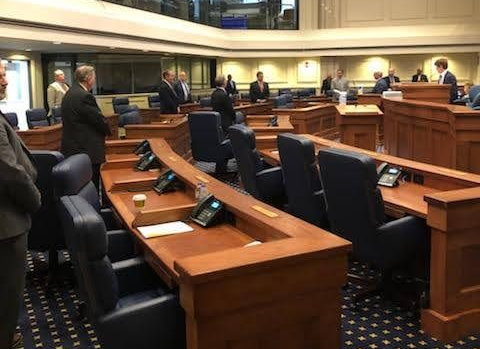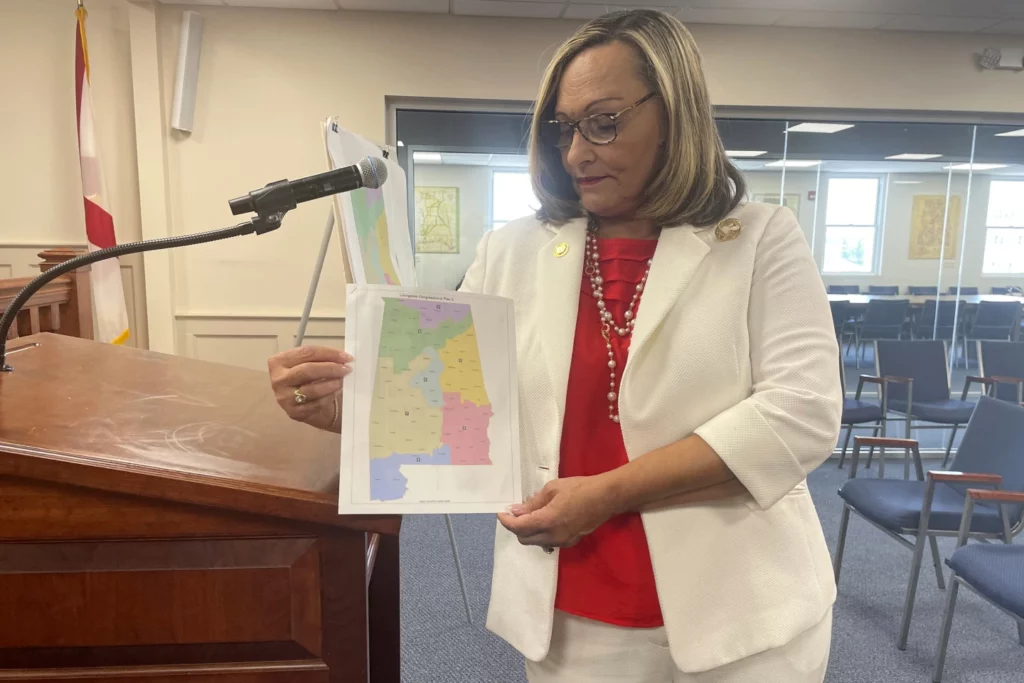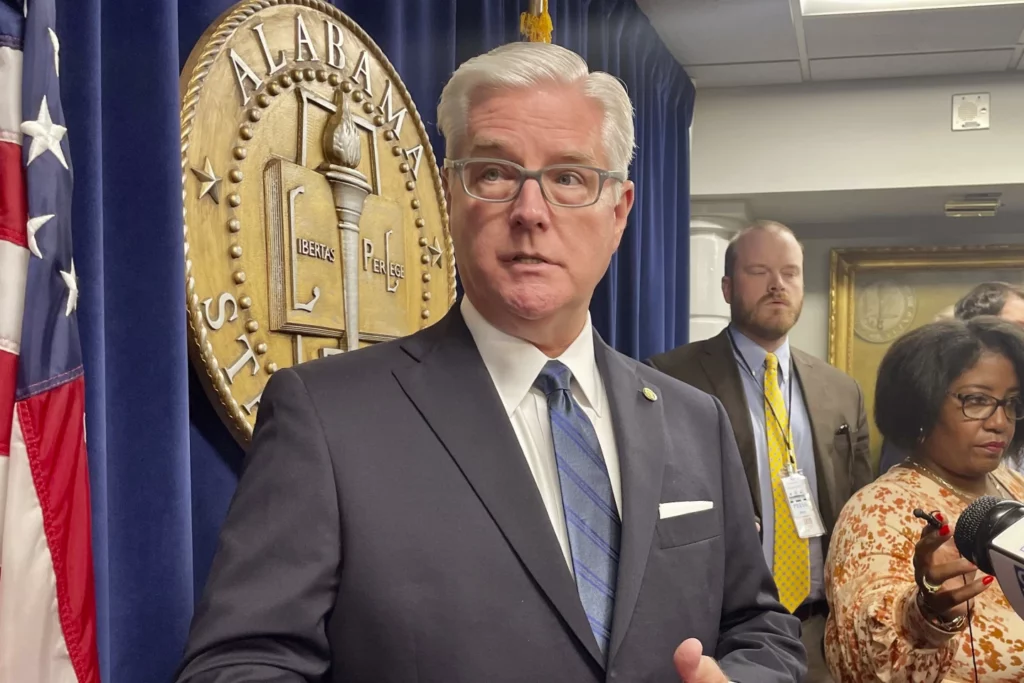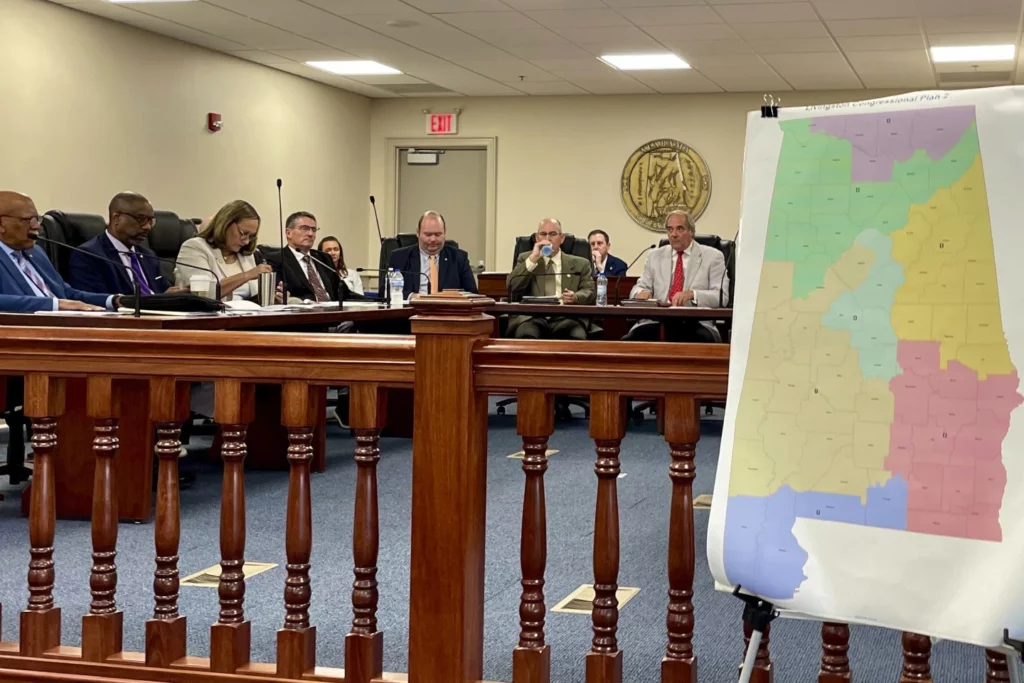Kay Ivey announces progress in expanding broadband infrastructure

On Tuesday, Alabama Governor Kay Ivey (R) kicked off her broadband tour at Oakman Middle School in Walker County. Ivey announced the statewide progress being made in expanding high-speed internet. “As I’ve said many times, our mission to give all Alabamians the ability to access high-speed internet is a journey, not a short trip,” said Gov. Ivey. “I’m proud to say that we’re making great progress across the state, providing more Alabamians with the infrastructural resources required when it comes to 21st-century success in education, health care, business, and the normalcies of everyday life. Expanding our digital infrastructure remains a critical priority for the Ivey Administration.” Ivey was joined at the event by Alabama Senate President Pro Tem Greg Reed (R-Jasper), Alabama Department of Economic and Community Affairs (ADECA) Director Kenneth Boswell, state Representative Matt Woods (R-Jasper), state Rep. Tim Wadsworth (R-Arley), and Oakman Mayor Cory Franks. The speakers addressed the nearly $12 million in grant and matching funds committed for broadband projects. This work has been completed to give more than 2,200 Waker County residents who are currently unserved the ability to be connected. Participants discussed the overall success of the Alabama Broadband Accessibility Fund (ABAF). ABAF is funded by the Alabama Legislature. Alabama received $1.4 billion from the U.S. Department of Commerce to help expand broadband access. It supports targeted projects in communities in need of high-speed internet access. These funds, awarded by ADECA, allow internet service providers to execute projects that connect individual households, businesses, community anchor institutions such as libraries and schools, and others to broadband infrastructure. “Through programs we funded in the Alabama Legislature, our state has been able to complete multiple broadband projects in Walker County, with many more currently underway,” said Pro Tem. Reed. “Our unconnected residents need high-speed internet access, and it is imperative that the state of Alabama continues to support projects that give Alabamians the opportunities created by bridging the digital divide. I’ve been proud to support efforts to expand high-speed internet access in the Alabama Senate, and I look forward to continuing working to give Alabamians the access they need.” Since 2018, Alabama has invested approximately $82 million in state dollars through grant awards supporting more than 100 projects through the Alabama Broadband Accessibility Fund. Once all of the Alabama Broadband Accessibility Fund projects awarded to date have been completed, access to broadband service will be available to more than 72,000 Alabama households, businesses, and community institutions that currently have no option to subscribe. “I’m proud of the efforts we have made at ADECA to support critical broadband projects across the state like the ones happening here in Walker County,” said Director Boswell. “None of these would be possible without the leadership of Governor Kay Ivey and the support of our Legislature. They recognize this critical need and have worked to address it. We still have more to accomplish, but with continued support, Alabama will reach its goal to get all of our citizens connected.” The state has received hundreds of millions of dollars through the American Rescue Plan Act and the infrastructure bill to spend on rural broadband projects. To connect with the author of this story or to comment, email brandonmreporter@gmail.com.
Personnel Update: J.J. McGrady to serve as new field representative in Rep. Robert Aderholt’s Jasper Office

On Wednesday, Congressman Robert Aderholt (R-AL04) announced hiring J.J. McGrady as his new field representative for the Jasper District Office. “I’m excited to have J.J. onboard, and I know he’s ready to hit the ground running,” said Congressman Aderholt. “J.J. will be working the western portion of the district that was previously covered by Paul Housel. And while I know people really loved working with Paul, I know they will enjoy getting to know J.J. and working with him as well. He has already been out meeting with constituents and elected officials.” McGrady previously worked for the Alabama Trucking Association, where he served as Manager of Special Projects. McGrady is a 2021 graduate of The University of Alabama, where he received a Bachelor of Arts in Communications, double majoring in public relations and political science. While a student at Alabama, J.J. interned for the West Alabama Chamber of Commerce, the Business Council of Alabama (BCA), and the Alabama Senate, working for Senate Pro Tempore Greg Reed (R-Jasper). J.J. is pursuing his Master of Public Administration from Troy University. “I am thrilled to be joining Congressman Aderholt’s staff,” said McGrady. “To be able to help and serve the state that I have always called home is extremely special to me.” McGrady will be responsible primarily for covering the western portion of the Fourth District. This includes a large portion of Tuscaloosa County, which McGrady is especially excited about as both he and his wife Amanda are huge University of Alabama fans. Robert Aderholt was first elected to represent Alabama’s Fourth Congressional District in 1996. He is serving in his fourteenth term and is running again in 2024. Aderholt is an attorney and previously served as Chief Counsel for Alabama Governor Fob James (R) To connect with the author of this story or to comment, email brandonmreporter@gmail.com
Taxpayer rebates coming in 30 days

On Wednesday, Governor Kay Ivey announced that Alabama taxpayers will receive their one-time tax rebates beginning on December 1. Ivey first announced her plan to utilize Alabama’s historic budget surplus to provide a tax rebate to working Alabama families during her 2023 State of the State Address. “This is the people’s money, and it’s only right, while acknowledging we are recording revenues far exceeding normal and sustainable levels, we give a fair share of this money directly back to the people of Alabama,” Gov. Ivey said. The Alabama Department of Revenue (ALDOR) will issue the rebates beginning December 1, 2023. “From the very beginning, it has been my belief that it is the responsibility of government to be good stewards of taxpayer dollars while actively looking for ways to support citizens through tough times,” said Gov. Ivey. “Our country is in the midst of tough times, and Alabama families from all walks of life are unfortunately seeing that their paychecks aren’t going as far as they once did. Thanks to our unwavering commitment to fiscal responsibility, one-time tax rebates will be with our hard-working Alabamians in time for the holidays.” To qualify for the rebates, taxpayers must have filed a 2021 Individual Income Tax return, which ALDOR received on or before October 17, 2022. Non-residents, estates or trusts, or anyone who was claimed as a dependent during the 2021 tax year do not qualify. State Senator Greg Reed (R-Jasper) is the Senate President Pro Tempore. “The resilience of hardworking Alabamians and conservative fiscal policies passed by the Legislature have made our state economy strong,” said President Pro Tem. Reed. “With a strong state economy built on investment in Alabama’s future, we are equipped to be in a healthy economic position as a state for years to come. Because we are in such a strong economic position as a state, it is our job as responsible stewards of taxpayer money to return money to the people of Alabama through this rebate during the holiday season.” The amount of each rebate is based on the qualified taxpayer’s filing status: Single and married people who file separately can expect a $150 one-time rebate. Married couples who file jointly can expect to receive $300. “Inflation has hit our state hard in recent years,” said Senate Minority Leader Bobby Singleton (D-Greensboro). “These rebates will return some dollars back to the taxpayers and provide relief to help ease that inflationary burden.” Qualified taxpayers can expect to receive their rebate based on how they received their 2021 tax year refund, by direct deposit or paper check. For qualified taxpayers who did not receive a 2021 tax year refund, the rebate can be expected by paper check. Rep. Nathaniel Ledbetter (R-Rainsville) is the Speaker of the Alabama House of Representatives. “In recent years, we’ve witnessed federal spending spiraling out of control, resulting in some of the highest inflation rates in decades,” said Speaker Ledbetter. “This has had a tangible impact on families in our state. The Alabama House worked hand-in-glove with the governor to help ease that burden.” “The Alabama Legislature worked hard with the governor this year to put money back in people’s pockets,” said House Minority Leader Anthony Daniels (R-Huntsville). These tax rebates are just in time for the holidays and can help make the season a little brighter for Alabama families.” The rebates will not be taxable for Alabama income tax purposes. Ivey had originally wanted a more significant rebate. The version of the budget that passed out of the Senate included no rebate but did include tax cuts. The Alabama House of Representatives restored the rebate, and the 2024 budget that went into effect on October 1 includes tax rebates and tax cuts. For many families, this rebate could pay for their Christmas. To connect with the author of this story or to comment, email brandonmreporter@gmail.com.
Steve Livingston elected new Senate Majority Leader, replacing Clay Scofield

On Monday, Senate President Pro Tempore Greg Reed (R-Jasper) announced that State Senator Steve Livingston (R-Scottsboro) had been elected the new Senate Majority Leader, replacing Sen. Clay Scofield (R-Guntersville), in a meeting of the Republican state senators. “The process of electing Senator Livingston was efficient and effective,” Reed said. “The Republican Caucus emerged with a united decision, and we look forward to continuing to lead Alabama toward guaranteeing the state is a better place to live, work, and raise a family. I am excited about the transformative work we are doing and the goals we will achieve throughout our third quadrennium of leadership.” Speaker of the House Nathaniel Ledbetter (R-Rainsville) congratulated Livingston on his election. “In addition to being one of my closest friends for many years, Steve Livingston has been a mentor of mine since the first moment I joined the House and a strong leader whose example I respect deeply,” said Ledbetter. “Sen. Livingston is a man of strong convictions and conservative beliefs, and he will lead his colleagues with the fairness, strength, and common sense that are his trademarks.” As was reported by Alabama Today, Sen. Scofield resigned from the Senate on Monday. “I have resigned from the Senate to become the Executive Vice President of the Business Council of Alabama,” Scofield wrote in a letter. This decision was one of the hardest that I have ever had to make, and with any decision of this magnitude, I involved a lot of prayer and talked it over with family and friends. If I didn’t love serving you, the decision would have been easy. It’s a dream job with an organization whose mission I strongly believe in. I have always supported policies that make Alabama more business-friendly because if we have healthy businesses, they can create more high-paying jobs. As President Ronald Reagan said: “I believe the best social program is a job.” This new job will allow me to continue my mission to make Alabama the most business/job-friendly state in the nation. “I also want to thank Senator Scofield for his unwavering dedication to the state of Alabama during his term as Majority Leader and tenure in the Alabama Senate,” Reed said. “After entering the Senate together nearly 14 years ago, Senator Scofield has proven himself to be an enduring friend, an exceptional leader, and a true champion for the people of Alabama. We wish Senator Scofield well in his future endeavors.” The Majority Leader is the second most powerful member of the Senate, behind the President Pro Tem. Next would be the Senate Rules Committee Chairman – Sen. Jabo Waggoner (R-Vestavia). Livingston represents Jackson, Dekalb, and Madison counties in the Alabama Senate, To connect with the author of this story or to comment, email brandonmreporter@gmail.com.
Clay Scofield reported to be leaving Alabama Senate

Senate Majority Leader Clay Scofield (R-Guntersville) is expected to resign his position in the Alabama Senate this week – perhaps as early as Monday – sources say. Scofield is expected to leave the State Senate to accept a role with the Business Council of Alabama (BCA). Sources claim that the Alabama Ethics Commission has reportedly approved Scofield’s acceptance of the powerful position most typically associated with the BCA’s lobbying efforts, with the understanding that he will not personally lobby the State Senate until the two-year revolving door period has passed. Scofield, 43, is a poultry farmer with a degree in agricultural economics from Auburn University. The BCA, which represents both small and large businesses, is one of the most influential lobbying forces in Montgomery. Their most recent success, however, comes not from a lobbying win but from the election of their past president, Katie Britt, to the U.S. Senate. After years of supporting failed candidates for the U.S. Senate, Britt’s campaign found its footing running not as the BCA choice but by distancing her from the powerful organization she ran beginning in 2018 and emphasizing her ability to show independence from their moderate agenda. Britt bucked the BCA publically against the COVID Vaccination Mandates. BCA, while often at odds with the pulse and tone of voters, has remained one of the strongest campaign and lobbying powerhouses of the state. Other entities wielding comparable influence include the Alabama Farmers Federation (ALFA), the Alabama Education Association (AEA), and the Alabama Forestry Association. Should Scofield deflect from the legislature to the BCA, leaving an open position in the State Senate, a special election would have to be called by Alabama Governor Kay Ivey. Sources report to Alabama Today that both Rep. Brock Colvin (R-Guntersville) and Rep. Wes Kitchens (R-Boaz) are expected to seek the position. The part-time position in the Alabama Senate pays $53,913 per year. The regular legislative session is a maximum of thirty legislative days. Republicans presently control 28 of the 35 seats in the Alabama Senate. The 27 remaining Republican state Senators will have to select a new Majority Leader. The Majority Leader is second in power in the Senate to only the President Pro Tem. – currently Sen. Greg Reed (R-Jasper). Scofield was elected in the Republican wave election of 2010 – which saw the GOP gain control of both Houses of the Alabama Legislature for the first time in 135 years. Scofield was unopposed in 2018 and 2022. Scofield has denied reports by 1819 News that he intends to leave the Senate to become a lobbyist. However, it is still possible that this is true. To connect with the author of this story or to comment, email brandonmreporter@gmail.com.
Redistricting plan goes to a conference committee

On Friday, the Alabama House of Representatives passed a Republican congressional redistricting plan that it hopes will comply with the Voting Rights Act of 1965. The Alabama Senate voted 30 to 0 to non-concur with the House plan. The redistricting plan has been referred to a conference committee to produce a compromise version that is acceptable to both Houses of the Legislature. For redistricting to pass out of the Legislature, the six-member conference committee has to reach a compromise. Then both Houses of the Legislature must vote to concur with the findings of the conference committee. Senate Bill 5 is sponsored by State Senator Steve Livingston (R-Scottsboro). The bill was carried in the House of Representatives by State Representative Chris Pringle (R-Mobile). Both Livingston and Pringle have introduced competing versions of the redistricting bill. The version of the bill that passed in the House is the Pringle version, the community of interest plan. Pringle’s plan would redraw Alabama’s Second Congressional District, currently represented by Congressman Barry Moore (R-AL02), to increase the Black voting age population in CD2 from 30% of the population to over 42%. Senate Democrats have introduced multiple plans that would produce two majority-minority districts. Livingston’s competing plan passed out of the Senate on Wednesday. Pringle says that his plan’s CD2 would meet the Supreme Court’s ruling that the state provides an opportunity for Blacks to pick a candidate of their choice. Democrats disagree. “You are giving me an opportunity to lose,” said Senate Minority Leader Bobby Singleton (D-Greensboro). “There ain’t no opportunity there for Blacks or Democrats in that district,” said Sen. Rodger Smitherman (D-Birmingham). Democrats maintain that it is necessary for there to be two majority-minority congressional districts for Black voters to have an opportunity to choose their own representation. They also maintain that that is what the court intended. Sen. Merika Coleman (D-Birmingham) said, “I contend that for African Americans to choose the candidate of their choice that we have to have a majority of African-Americans.” “It is irresponsible for the legislature to do what it is doing,” Coleman said. “The court ordered two districts that have 50% African Americans.” “The three-judge panel said that a proper remedy could consist of two majority-minority districts or quite close to it,” said Rep. Artis “A.J.” McCampbell (D-Livingston). The House of Representatives passed SB5 76 to 26. The Senate, in their own debate on redistricting, then voted 30 to 0 to concur with the House version of SB5 and go to a conference committee. Senate President Pro Tempore Greg Reed (R-Jasper) appointed Sens. Livingston, Smitherman, and Clay Scofield (R-Guntersville) to the conference committee. Speaker of the House Nathaniel Ledbetter (R-Rainsville) appointed Pringle, Chris England (D-Tuscaloosa), and Chris Sells (R-Greenville) to the conference committee. Both Houses of the Legislature will return on Friday afternoon, presumably to vote on the conference committee report. To connect with the author of this story or to comment, email brandonmreporter@gmail.com.
Legislature to finish redistricting today

On Friday, both Houses of the Alabama Legislature will meet on redistricting. The federal appeals court in Atlanta has set Friday, July 21, as the deadline for the state to submit a new congressional redistricting for the court to consider in the state’s ongoing Voting Rights Act case concerning congressional redistricting. There are a lot of disagreements in the Legislature on what plan the legislators should pass. Legislative Democrats, the plaintiffs in the lawsuit against the state, and civil rights groups believe that to comply with the Voting Rights Act of 1965, the state should pass a plan with two majority-minority districts. This would almost certainly mean a pickup of one House of Representatives seat for Democrats in the U.S. Congress as Alabamians overwhelmingly vote along racial lines, with over 90% of Black Alabamians preferring Democrats and over 80% of White Alabamians preferring Republicans in recent elections. Alabama’s Legislative Republicans have rejected calls by Democrats to turn Alabama’s Second Congressional District into a majority-minority district. Congressional District 2 is currently represented by Congressman Barry Moore (R-Enterprise) – who served two terms in the Alabama House of Representatives from 2010 to 2018. Moore is a Republican, a member of the conservative Freedom Caucus, and an ardent Donald Trump supporter. Currently, 30% of the voters of CD2 are Black. State Senator Rodger Smitherman (D-Birmingham) has introduced a plan that would turn Congressional District 2 into a majority-minority district with over 50% of the voters in the district being Black. Republicans rejected that map as well as others introduced by Sen. Bobby Singleton (D-Greensboro) and other Democrats. Republicans maintain that the court has not ruled on Milligan v. Allen that the state is in violation of the Voting Rights Act. Democrats look at the same U.S. Supreme Court ruling and the recent order by a three-judge panel of the Eleventh Circuit Court of Appeals and say that the court did not provide the state with enough guidance to know what an “opportunity district” means. “That could be 42% (Black voters), that could be 38%, we just don’t know,” Senate President Pro Tempore Greg Reed (R-Jasper) told reporters. House Republicans have passed a plan by State Representative Chris Pringle (R-Mobile) they title the community of interest plan where Congressional District 2 is over 42% Black. Pringle maintains that that is close enough racially so that it is winnable by either party. Senate Republicans have passed a competing plan by State Sen. Steve Livingston (R-Scottsboro). The Livingston plan would only raise the Black voting age population of CD2 from 30% Black to 38% Black. Livingston said his plan kept communities of interest together and is the most compact while still providing an opportunity district for Black voters in Congressional District 2. More radical elements in the Legislature had called for turning Alabama’s Seventh Congressional District into an opportunity district that would be potentially winnable by Republicans. Congressional District 7 is represented by Terri Sewell – the only Democrat and the only Black representative in the congressional delegation. Both Pringle and Livingston, while deeply divided on the merits of their respective plans, did not go that far, and Congressional District 7 remains majority Black. Livingston said that his plan kept the Wiregrass whole and in the Second Congressional District, and it keeps the Gulf Coast and Mobile County whole. The House passed Pringle’s plan on Wednesday, but when he brought his bill to the Senate, Livingston motioned to substitute the Pringle plan for the Livingston plan. The Committee passed that motion. Pringle then stormed out of the room without continuing to present his bill. His bill, now the Livingston Bill, was passed by the Committee along party lines, with Democrats voting against it and Republicans voting for it. The one exception was State Senator Andrew Jones (D-Centre). His primary disagreement with the Livingston plan is that a small portion of northwest Etowah County would be in Congressional District 4, while 90% of Etowah County would switch to Congressional District 3. Jones told reporters he did not care whether Congressman Mike Rogers (R-AL03) or Robert Aderholt (R-AL04) represented Etowah County. “My issue is that historically Etowah County has not been divided,” Jones, who represents Etowah and Cherokee Counties, said. Smitherman told reporters that he and Sen. Singleton had brought their own federal lawsuit and joined Milligan and the other plaintiffs. Smitherman said that it is his understanding that the plaintiffs will be given the opportunity to tell the court whether the plan passed by the Legislature satisfies their concerns or not. “Right now, I can’t support either (Republican) plan,” Smitherman said. Smitherman has demanded that the Apportionment Committee prepare a report on the plans showing the likelihood of a Democrat or a Republican winning each of these. “They can get that, or they already know it and don’t want to release it,” Smitherman said, Since the GOP is wildly divided on which plan they will advance to federal court, there is uncertainty about what the Legislature will pass on Friday. “Obviously, there will be negotiations,” Reed said. A compromise plan can be substituted on the floor of either House. Failing that, any difference between the House and Senate plans would be settled by a conference committee. If that happens, then under the circumstances, both Houses will recess until the conference committee returns with a conference committee plan to vote on. If the state and the plaintiffs cannot agree on a redistricting plan that is acceptable to both sides, a trial will likely be held in the eleventh circuit. Whatever is ultimately decided by the federal appeals court in Atlanta will likely be appealed by whichever party is dissatisfied with the outcome meaning that the Milligan case could go back to the Supreme Court, where Justice Brett Kavanaugh appears to be the swing vote. There is even a possibility that this case may not be resolved until after the 2024 elections. To connect with the author of this story or to comment, email brandonmreporter@gmail.com.
Alabama lawmakers are divided on eve of major redistricting deadline impacting Black voters

On the eve of a court deadline, Alabama lawmakers are still divided Thursday over the map designating new congressional districts and sparred over what constitutes an “opportunity” district that the state was ordered to create for Black voters. Republican-controlled committees in the House of Representatives and Senate continue to advance separate plans that increase the number of Black voters in the state’s 2nd congressional district but fail to establish the second majority-Black district, as sought by plaintiffs who won the Supreme Court case last month. Under the state Senate plan, the number of Black voters in the 2nd congressional district would increase from about 30% to 38%; under the House plan, it would increase to 42%. “We believe it does meet the Voting Rights (Act) standard because we followed all the guidelines. As an opportunity district, nobody knows what the definition of opportunity is. They didn’t give us (a definition),” Sen. Steve Livingston said. The Republican senator from Scottsboro said the chamber settled on 38% of the population of Black voters as adequate to fulfill the court’s directive. “So I’ve got an opportunity to lose,” said Senate Minority Leader Bobby Singleton, a Democrat from Greensboro. Black lawmakers argued those numbers would make it impossible for a Black candidate to win in that district, and do not comply with the court directive to create a second majority-Black district “or something quite close to it.” “There ain’t no way that in that district — that we’re dealing with here in two — that an African-American got a chance to get elected. Ain’t no way whatsoever,” said Democratic Sen. Rodger Smitherman of Birmingham. State lawmakers face a Friday deadline to adopt new lines after the U.S. Supreme Court in June upheld a three-judge panel’s finding that the current state map — with one majority-Black district out of seven in a state that is 27% Black — likely violates the federal Voting Rights Act. State Republicans, who have been reluctant to create a Democratic-leaning district, are engaging in a high-stakes wager that the panel will accept their proposal, arguing that the compact scale of the districts satisfies redistricting principles, or that the state will prevail in a second round of appeals. The panel that issued a preliminary injunction blocking use of the existing map said in 2022 that Alabama should have “either an additional majority-Black congressional district or an additional district in which Black voters otherwise have an opportunity to elect a representative of their choice.” The judges added that any map should include two districts where “Black voters either comprise a voting-age majority or something quite close to it.” The meaning of the terms “quite close” and “opportunity” has dominated much of the legislative debate. “We’ve got information that’s come from the court. We’ve had information come from the justices, but much of this is speculative as to what they meant,” Senate President Pro Tem Greg Reed, the Republican leader of the Senate, told reporters Thursday. Reed said lawmakers are working toward a compromise between the state House and Senate plans, and that the lawmakers will “absolutely” meet the Friday deadline. Once a new GOP map is approved, the fight will shift quickly back to the courts. A Democratic state senator speculated that Alabama Republicans are seeking another Voting Rights Act challenge before the U.S. Supreme Court. “I think the (Alabama) attorney general is setting up a war with Section 2 (of the Voting Rights Act) so once they get back, they can have a real shot at gutting Section 2. That’s just my gut,” Singleton said. Plaintiffs who won the Supreme Court case have said they will challenge either proposal if enacted. Scott Douglas, executive director of Greater Birmingham Ministries and a plaintiff in the case, said lawmakers have “apparently learned nothing from their loss at the Supreme Court. The Legislature has put forward yet another map that dilutes the electoral power of Black Alabamians.” Republished with the permission of The Associated Press.
After court ruling, Alabama GOP criticized for rejecting 2nd majority-Black congressional district

Alabama Republicans on Tuesday advanced proposals to boost the number of Black voters in one of the state’s seven congressional districts, but critics said the plans flout a court order to create a second majority-Black district or something close to it. Lawmakers must adopt new maps by Friday after the U.S. Supreme Court in June upheld a finding that the current state map — with one majority-Black district in a state that is 27% Black — likely violated the federal Voting Rights Act. Republican-controlled legislative committees on Tuesday voted down proposals to create a second majority-Black district and advanced separate GOP plans that would increase the percentage of Black voters in the 2nd Congressional district from about 30% to either 38% or 42%. That is short of the 50% sought by plaintiffs who won the Supreme Court case. Republicans said their plan complies with the court’s directive to draw a district where Black voters are present in enough numbers to influence the outcome of an election. “They told us draw a map with either an additional majority-minority district or a district that allows Black voters otherwise to elect the representative of their choice. I believe (this) map that you have before you best addresses the issues before the court,” Republican Rep. Chris Pringle told the House committee. Pringle said the district, which would have a Black voting age population of 42% under his bill, would be a swing district that could be won by either a Republican or a Democrat. Senators advanced an amended map where the Black voting age population would be 38% instead of 42% in the 2nd district. Sen. Vivian Davis Figures, a Democratic lawmaker from Mobile, said the Senate proposal is “nowhere close” to what was suggested by the court. She said the district would remain under white Republican control with those numbers. “We don’t think this is going to pass muster with the court,” Figures said. She said the Republicans are headed down a path that will ensure extended litigation, “continuing to spend millions of dollars of taxpayer money just so they don’t give all of Alabama’s citizens a seat at the table for their voices to be heard.” Republicans have been resistant to creating a Democratic-leaning district and are wagering on what the three-judge panel will accept — or that the state will be successful in a second round of appeals. The three-judge panel could step in and draw its own plan if the judges deem lawmakers’ proposal unacceptable. The three-judge panel found that Alabama’s existing congressional map diluted the voting power of Black residents. “The appropriate remedy is a congressional redistricting plan that includes either an additional majority-Black congressional district or an additional district in which Black voters otherwise have an opportunity to elect a representative of their choice,” the lower-court panel wrote in its 2022 ruling. It added that the plan would need to include two districts in which “Black voters either comprise a voting-age majority or something quite close to it.” Senate President Pro Tempore Greg Reed, the Republican leader of the Senate, said lawyers have advised that the Senate plan complies with court order, although “there’s going to be certainly more debate.” He added that those drafting the plan are trying to weigh what is important to the court. “Are you really wanting us to focus on community of interest issues, which they stated in the order? Or are we looking at voting populations? Which one is more important?” Reed said. The proposals head to their first floor votes on Tuesday. The three-judge panel that blocked the use of the current map gave Alabama until Friday to submit a new plan for review. Rep. Barbara Boyd, a Democratic lawmaker from Anniston, said Alabama has a long history of “refusing to do the right thing.” “Don’t continue to allow the courts to have to force us to do what we know is right,” Boyd told her colleagues on the House committee. Republished with the permission of The Associated Press.
Greg Reed & Clay Scofield: Protecting our conservative values

The 2023 legislative session proved to be another successful and productive one for the Alabama Senate Republicans. We effectively utilized all thirty legislative working days with 340 bills filed in the Senate. We welcomed four newly elected Republican senators at the start of the year and passed key legislation that will continue to make Alabama the best state in the country to live and do business. On behalf of the Alabama Senate Republican Caucus, we are proud to report the following legislative efforts that will continue to protect our conservative values and support the hardworking people of Alabama: REPAYING DEBT TO ALABAMA TRUST FUND: The Alabama Senate approved roughly $59.9 million in a final payment to the Alabama Trust Fund to satisfy money taken from the fund during the previous decade. This payment to the Alabama Trust Fund makes us ‘debt-free’ and fulfills our obligation to the citizens we represent as effective and honest stewards of state funds. SPARKING ECONOMIC GROWTH: The Alabama Legislature passed a four-bill package led by Governor Kay Ivey and coined “The Game Plan” to secure Alabama’s economic future. Governor Kay Ivey’s Game Plan is strategic, innovative, and clearly outlined to help Alabama continue building on our success and providing more, higher-paying jobs to the citizens of our state. The Game Plan extends and enhances economic incentives for recruiting businesses to Alabama, increases funding for site development, supports innovative industries in our state, and ensures transparency surrounding the incentive process. This is a win for jobs, businesses, and every Alabamian. FIGHTING ESG: The Alabama Senate passed SB261, a bill that would prohibit state contracts with businesses that boycott certain sectors of the economy based on environmental, social, and governance. This bill is among the strongest anti-ESG legislation in the nation to protect investors and funds in Alabama and fight against the woke liberal influence across America. PROTECTING SMALL BUSINESSES: Alabama Senate Republicans championed new initiatives to support and protect small businesses in our state. Key legislation included a dram shop bill to protect providers of alcohol if the recipient injures a third party, retail theft legislation to create harsher punishments for people convicted of stealing from retailers and a road builder liability bill to provide relief and protection to that industry. CRACKING DOWN ON DRUG DEALERS: Top of mind for the Alabama Senate Republicans, each session is protecting our families and children. This session, we buckled down on the fentanyl crisis to crack down on drug dealers and establish mandatory minimum prison sentences for convicted fentanyl dealers. Additionally, legislation was passed to prevent gang violence, combat illegal narcotics and activities, and keep violent felons behind bars where they belong. STANDING WITH OUR TROOPS: A key mission of the Alabama Senate Republicans is to provide ample support for our state’s extended defense, aerospace, and intelligence communities. The legislature passed and Governor Ivey signed a series of bills to ensure Alabama remains the nation’s most attractive and friendliest state for active-duty military, their families, and veterans. Specific bills include extending tuition benefits for the National Guard, expanding education benefits to spouses whose partners were killed on active duty, defining “dignified and humane” disposal of unclaimed veteran remains, and allowing out-of-state military personnel to purchase insurance in the state where they are stationed for their Alabama vehicles. CUTTING TAXES: The Senate passed several pieces of legislation to keep money in the pockets of hardworking taxpayers and small businesses. The Grocery Tax Cut reduces the state’s sales tax on grocery items from 4% to 3% on September 1, with the potential to decline to 2% in 2024 based on the state’s revenue growth. Other tax-reducing measures passed by the legislature include a one-time tax rebate, eliminating the payroll tax on overtime pay, and a provision that reduces the administrative burden and costs for small business owners by increasing the sales tax reporting threshold. EXPANDING SCHOOL CHOICE: Creating and expanding educational opportunities for our state’s children has been and will continue to be a top priority for the Alabama Senate Republicans. The expansion of the Alabama Accountability Act through SB263 opens the doors for more students to participate in this already successful tax credit program. Together, we’re supporting the future generations of Alabamians! SUPPORTING AGRICULTURE: Agriculture is one of Alabama’s top-producing industries, accounting for more than 20 percent of jobs in the state. The Alabama Senate Republicans continue to support farmers and agriculture across Alabama through legislative efforts. Two specific accomplishments include cutting “red tape” for farmers in reporting referendums on an asset and establishing the Logging Efficiency Grant Fund to support rural economic development. Greg Reed is the Alabama Senate President Pro Tem and represents District 5. Clay Scofield is the Alabama Senate Majority Leader and represents District 9.
Alabama lawmakers end session marked by tax cuts

Alabama lawmakers on Tuesday concluded the 2023 legislative session that was marked by tax cut measures and ended with the shelving of some controversial measures, including a bill that would make it a crime to help a non-family member fill out an absentee ballot. Republican and Democratic leaders cited the tax cut measures, which included removing half of the 4% state sales tax on groceries, as well as a temporary tax cut on overtime pay. “Those tax cuts were focused on working Alabamians,” said Senate President Pro Tempore Greg Reed, R-Jasper. House Speaker Nathaniel Ledbetter said the session resulted in the “largest tax cut in Alabama history” with the partial removal of the state sales tax on food. “It’s been a historic session, in my opinion, and it’s the work of the body that has made that possible,” he said. Some lawmakers, mostly Democrats, had attempted for more than a decade to remove the sales tax on food, but the effort failed amid concerns about the cost to education funding. The effort drew broad bipartisan support this year in the face of soaring grocery prices and larger-than-usual tax collections. Sen. Merika Coleman, D-Pleasant Grove, who had pushed for the full removal, said she was “excited that the people of Alabama will get some sort of relief on their grocery taxes.” Lawmakers on Tuesday shelved a number of controversial measures rather than get bogged down in contentious floor debates on the final night of the legislative session. The absentee ballot proposal, which cleared the House on a party-line vote, had emerged as one of the most contentious issues of the session. It did not get a vote in the Alabama Senate. Republicans had said the measure was needed to prevent voter fraud, including so-called ballot harvesting, but opponents called it an attempt at voter suppression by threatening people with jail time for helping someone vote. Kathy Jones, president of the League of Women Voters of Alabama, said she was relieved the bill did not pass. She said it would have authorized the state to “intimidate, arrest and prosecute patriotic, law-abiding citizens for merely helping their friends and neighbors be able to vote absentee.” Other measures that died on the final meeting day of the session included an effort to strengthen the state public records law and a long-running effort to require students to complete kindergarten or demonstrate first-grade readiness, before starting first grade. Ledbetter said Alabama Gov. Kay Ivey’s office had concerns about the public records bill. “We are very disappointed that we didn’t get the bill passed this year. The governor’s legal team did not agree with the finite timeline to produce a public record,” Felicia Mason, executive director of the Alabama Press Association, wrote in an email. The Republican governor had expressed her support for the first-grade readiness bill in her State of the State address. The House had approved the measure, but it did not get a vote in the Alabama Senate where a Democratic senator had raised concerns. Rep. Pebblin Warren, D-Tuskegee, said she will bring the bill back next year. “We’re going to keep on trying for our babies, and I’m going to keep on fighting,” Warren said. Republished with the permission of The Associated Press.
Alabama Legislature passes anti ESG legislation

On Thursday, the Alabama Senate passed legislation that would require companies that want state of Alabama contracts to forgo any sort of ESG (environmental, social, and governance) woke corporations or ESGs. Senate Bill 261 (SB261) is sponsored by State Senator Dan Roberts (R-Mountain Brook). It is carried in the House by Rep. Chip Brown (R-Hollinger’s Island). The anti-ESG legislation would prohibit state and local governments from entering into certain contracts that boycott businesses in certain sectors or based on certain environmental or corporate governance criteria. SB261 has been billed as the strongest anti-ESG legislation in the nation. Though the legislature is split along partisan lines on this legislation, both sides elected not to debate the issue in the House of Representatives. Instead, they advanced the bill directly to a vote when it came up on Wednesday’s special-order calendar. The bill prohibits governmental entities from entering into certain contracts with companies that boycott businesses because the business engages in certain sectors or does not meet certain environmental or corporate governance standards, or does not facilitate certain activities. The legislation authorizes the Attorney General to take action to investigate and enforce this act. “I appreciate the support of my colleagues in the Senate for working to pass this legislation,” Sen. Roberts told reporters. “The Alabama Senate has made it clear that we want businesses to focus on growing and expanding and not working to push any political agenda with left-wing ESG policies.” If a company engages in social activism banned by the legislation, then it can’t do business with any local or state government. According to the bill, “This bill would prohibit a governmental entity from entering into a public contract for goods or services with certain companies or businesses that engage in the economic boycott of businesses in certain sectors and industries; that fail to meet or commit to meet certain environmental standards; that fail to meet or commit to meet certain corporate governance criteria; or that fail to facilitate certain activities.” Companies would have to sign a verification that it does not engage in boycotts of other companies and industries. Governments can opt out of this provision if they can prove that it would have an adverse economic effect on that government if they can’t do business with that company. The bill states, “The Attorney General shall seek to prohibit the adoption of federal laws, rules, regulations, bulletins, executive orders, or other federal actions that may penalize, inflict economic harm on, limit commercial relations with, or change or limit the activities of a company in the state or a resident of the state based on the furtherance of economic boycott criteria or other similarly oriented rating.” It also protects companies from state or local governments trying to pressure them company into adopting woke political action. “No company in this state shall be penalized, have economic harm inflicted on it, have commercial relations limited, or have the activities of the company changed or limited by a governmental entity because the company will not engage in economic boycotts; will not establish or implement policies, procedures, guidelines, rules, reports, products, services, notices, disclosures, or rates or pricing; will not provide or submit answers to surveys or other information requests or disclosures; will not invest in or divest of certain securities, stocks, bonds, bills, partnerships, or other investment arrangements; or will not initiate other corporate or business practices that further social, political, or ideological interests including, but not limited to, economic boycott criteria or other similarly oriented rating.” “We have industry in or state that can be hurt by things going on nationally,” Roberts explained on the Senate floor. “We are trying to put them in position so they can thrive. We are trying to make sure that they have access to the mother’s milk of capital in the future.” Sen. Bobby Singleton (D-Greensboro) brought an amendment to the committee substitute of the bill. “It was given to me by the governor’s office,” Singleton said. “The finance department, they just wanted to make sure that they are protected in dealing with the state’s debt obligations.” Roberts accepted the Singleton amendment as friendly. “I think this is an anti-business bill,” Singleton said. “You are telling people that do business in the state of Alabama that you can’t have a social conscience.” “This is not a pro-business bill,” Singleton said. “Dan, you are wrong on this one. I will tell you, Dan, that you are wrong on this one.” “You can’t listen to Fox and decide what you are going to do,” Singleton continued. “We can’t be Florida 20. We won’t be able to recruit with this on the ground. This is a threat to business. If I don’t sign this paragraph, I can’t do business in Alabama.” Senate President Pro Tempore Greg Reed (R-Jasper) said, “This is a difficult topic. This is one that is at a national level that we have to deal with.” Sen. Sam Givhan (R-Huntsville) said, “We did have great dialogue. We had businesses across the gamut in the state of Alabama. We sat down in a room with them, and they presented us with their redlines.” Sen Robert Stewart (D-Selma) said, “Corporations do have an obligation to be good actors.” Givhan responded, “Their job is to maximize shareholder wealth.” Givhan explained the Singleton amendment, which exempts the State Finance Department from following this when refinancing debt obligations. “Debt obligations – that is targeted at the bond market,” Givhan said. “There is not a lot of businesses in that space. We wanted to make sure that we weren’t shooting ourselves in the head. Some think we may have opened the barn door too much.” SB261 passed the Alabama House of Representatives 74 to 27. It had previously passed the Senate by a vote of 27 to 8. The legislation now goes to the Governor for her consideration. Wednesday was day 28 of the 2023 Alabama Regular Legislative Session. To connect with the author of this story or to comment, email brandonmreporter@gmail.com.

